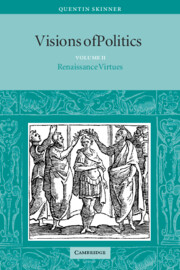Book contents
- Frontmatter
- Contents
- List of plates
- General preface
- Full contents: Volumes 1–3
- Acknowledgements
- Conventions
- 1 Introduction: The reality of the Renaissance
- 2 The rediscovery of republican values
- 3 Ambrogio Lorenzetti and the portrayal of virtuous government
- 4 Ambrogio Lorenzetti on the power and glory of republics
- 5 Republican virtues in an age of princes
- 6 Machiavelli on virtù and the maintenance of liberty
- 7 The idea of negative liberty: Machiavellian and modern perspectives
- 8 Thomas More's Utopia and the virtue of true nobility
- 9 Humanism, scholasticism and popular sovereignty
- 10 Moral ambiguity and the Renaissance art of eloquence
- 11 John Milton and the politics of slavery
- 12 Classical liberty, Renaissance translation and the English civil war
- 13 Augustan party politics and Renaissance constitutional thought
- 14 From the state of princes to the person of the state
- Bibliographies
- Index
- Plate section
5 - Republican virtues in an age of princes
Published online by Cambridge University Press: 05 September 2012
- Frontmatter
- Contents
- List of plates
- General preface
- Full contents: Volumes 1–3
- Acknowledgements
- Conventions
- 1 Introduction: The reality of the Renaissance
- 2 The rediscovery of republican values
- 3 Ambrogio Lorenzetti and the portrayal of virtuous government
- 4 Ambrogio Lorenzetti on the power and glory of republics
- 5 Republican virtues in an age of princes
- 6 Machiavelli on virtù and the maintenance of liberty
- 7 The idea of negative liberty: Machiavellian and modern perspectives
- 8 Thomas More's Utopia and the virtue of true nobility
- 9 Humanism, scholasticism and popular sovereignty
- 10 Moral ambiguity and the Renaissance art of eloquence
- 11 John Milton and the politics of slavery
- 12 Classical liberty, Renaissance translation and the English civil war
- 13 Augustan party politics and Renaissance constitutional thought
- 14 From the state of princes to the person of the state
- Bibliographies
- Index
- Plate section
Summary
When in chapter 2 I focused on the Regnum Italicum in the thirteenth century, I concentrated on two connected arguments that were central to the burgeoning republican literature of that formative period. One was the belief that our chief aspiration in public life should be to uphold civic peace and unity, thereby enabling our community to attain its highest goals of gloria and grandezza. The other was the connected belief that, if these goals are to be realised, it is indispensable that we should institute and uphold an elective system of republican government.
By the end of the thirteenth century these assumptions were beginning to be widely questioned, not least because it appeared to so many commentators that self-government had simply proved a recipe for endless civil strife. If our aim is to live in peace and unity, it began to be urged, it will always be safer to entrust our community to the strong government of a single signore or hereditary prince. These sentiments served at once to legitimise and encourage the widespread shift during this period dal' commune al principato, from traditional systems of elective government to the acceptance of the rule of princes. Such changes tookplace at Mantua and Verona in the 1270s, at Treviso, Pisa, Piacenza and Parma by the end of the 1280s and at Ravenna, Rimini and elsewhere before the end of the century.
- Type
- Chapter
- Information
- Visions of Politics , pp. 118 - 159Publisher: Cambridge University PressPrint publication year: 2002
- 3
- Cited by

